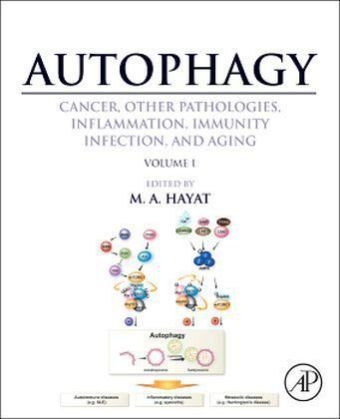
Autophagy: Cancer, Other Pathologies, Inflammation, Immunity, Infection, and Aging
Academic Press Inc (Verlag)
978-0-12-405530-8 (ISBN)
Understanding the importance and necessity of the role of autophagy in health and disease is vital for the studies of cancer, aging, neurodegeneration, immunology, and infectious diseases. Comprehensive and forward thinking, these books offer a valuable guide to both cellular processes while inciting researchers to explore their potentially important connections.
Considering that autophagy is associated with numerous biological processes, including cellular development and differentiation, cancer (both antitumor and protumor functions), immunity, infectious diseases, inflammation, maintenance of homeostasis, response to cellular stress, and degenerative diseases such as Alzheimer’s, Parkinson's, Huntington's, amyotrophic lateral sclerosis, and prion diseases, there is a great need to understanding its role. Cell homeostasis is achieved by balancing biosynthesis and cellular turnover. In spite of the increasing importance of autophagy in various pathophysiological situations (conditions) mentioned above, this process remains underestimated and overlooked. As a consequence, its role in the initiation, stability, maintenance, and progression of these and other diseases (e.g., autoimmune disease) remains poorly understood.
Volumes in the Series
Volume 1: Molecular Mechanisms. Elucidates autophagy’s association with numerous biological processes, including cellular development and differentiation, cancer, immunity, infectious diseases, inflammation, maintenance of homeostasis, response to cellular stress, and degenerative diseases such as Alzheimer’s, Parkinson's, Huntington's, amyotrophic lateral sclerosis, and prion diseases. Volume 2: Role in General Diseases. Describes the various aspects of the complex process of autophagy in a myriad of devastating human diseases, expanding from a discussion of essential autophagic functions into the role of autophagy in proteins, pathogens, immunity, and general diseases. Volume 3: Role in Specific Diseases. Explores the role of autophagy in specific diseases and developments, including: Crohn’s Disease, Gaucher Disease, Huntington’s Disease, HCV infection, osteoarthritis, and liver injury, with a full section devoted to in-depth exploration of autophagy in tumor development and cancer, as well as the relationship between autophagy and apoptosis.Volume 4: Mitophagy. Presents detailed information on the role of mitophagy, the selective autophagy of mitochondria, in health and disease, by delivering an in-depth treatment of the molecular mechanisms involved in mitophagy initiation and execution, as well as the role of mitophagy in Parkinson Disease, cardiac aging, and skeletal muscle atrophy. Volume 5: Role in Human Diseases. Comprehensively describes the role of autophagy in human diseases, delivering coverage of the antitumor and protumor roles of autophagy; the therapeutic inhibition of autophagy in cancer; and the duality of autophagy’s effects in various cardiovascular, metabolic, and neurodegenerative disorders.Volume 6: Regulation of Autophagy and Selective Autophagy. Provides coverage of the mechanisms of regulation of autophagy; intracellular pathogen use of the autophagy mechanism; the role of autophagy in host immunity; and selective autophagy. Volume 7: Role of Autophagy in Therapeutic Applications. Provides coverage of the latest developments in autophagosome biogenesis and regulation; the role of autophagy in protein quality control; the role of autophagy in apoptosis; autophagy in the cardiovascular system; and the relationships between autophagy and lifestyle. Volume 8: Autophagy and Human Diseases. Reviews recent advancements in the molecular mechanisms underlying a large number of genetic and epigenetic diseases and abnormalities, and introduces new, more effective therapeutic strategies, in the development of targeted drugs and programmed cell death, providing information that will aid on preventing detrimental inflammation.Volume 9: Necrosis and Inflammation in Human Diseases. Emphasizes the role of Autophagy in necrosis and inflammation, explaining in detail the molecular mechanism(s) underlying the formation of autophagosomes, including the progression of Omegasomes to autophagosomes.
Dr. Hayat has published extensively in the fields of microscopy, cytology, immunohistochemistry, immunocytochemistry, and antigen retrieval methods. He is Distinguished Professor, Department of Biological Sciences, Kean University, Union, New Jersey, USA.
I. GENERAL DISEASES 1. INTRODUCTION 2. MECHANISMS OF REGULATION OF P62 IN AUTOPHAGY AND IMPLICATIONS FOR HEALTH AND DISEASES 3. MOLECULAR MECHANISMS UNDERLYING THE ROLE OF AUTOPHAGY IN NEURODEGENERATIVE DISEASES 4. ROLES OF MULTIPLE TYPES OF AUTOPHAGY IN NEURODEGENERATIVE DISEASES 5. AUTOPHAGY AND CROHN’S DISEASE: TOWARDS NEW THERAPEUTIC CONNECTIONS 6. THE ROLE OF AUTOPHAGY IN ATHEROSCLEROSIS 7. TREATMENT OF DIABETIC CARDIOMYOPATHY THROUGH UPREGULATING AUTOPHAGY BY STIMULATING AMP-ACTIVATED PROTEIN KINASE 8. HYPERGLYCEMIA-ASSOCIATED STRESS INDUCES AUTOPHAGY: INVOLVEMENT OF THE ROS-ERK/JNK-P53 PATHWAY 9. ROLE OF AUTOPHAGY IN THE CELLULAR DEFENSE AGAINST INFLAMMATION 10. MYTOPHAGY PLAYS A PROTECTIVE ROLE IN FIBROBLASTS FROM PATIENTS WITH COENZYME Q10 DEFICIENCY 11. PRESENCE OF DIOXIN KIDNEY CELLS INDUCES CELL DEATH WITH AUTOPHAGY II. CANCER 12. MOLECULAR MECHANISMS UNDERLYING THE ACTIVATION OF AUTOPHAGY PATHWAYS BY REACTIVE OXYGEN SPECIES AND THEIR RELEVANCE IN CANCER PROGRESSION AND THERAPY 13. INDUCTION OF AUTOPHAGIC CELL DEATH BY ANTICANCER AGENTS 14. IMMUNOGENICITY OF DYING CANCER CELLS - THE INFLAMMASOME CONNECTION. AUTOPHAGIC DEATH ARRIVES TO THE SCENE 15. SELENITE-MEDIATED CELLULAR STRESS, APOPTOSIS AND AUTOPHAGY IN COLON CANCER CELLS 16. ENHANCEMENT OF CELL DEATH IN HIGH GRADE GLIOMA CELLS: ROLE OF N-(4-HYDROXYPHENYL) RETINAMIDE-INDUCED AUTOPHAGY 17. CISPLATIN EXPOSURE OF SQUAMOUS CELL CARCINOMA CELLS LEADS TO THE MODULATION OF AUTOPHAGIC PATHWAY III. TUMORS 18. AUTOPHAGY, STEM CELLS AND TUMOR DORMANCY 19. DEATH- ASSOCIATED PROTEIN KINASE 1 SUPPRESSES TUMOR GROWTH AND METASTASIS VIA AUTOPHAGY AND APOPTOSIS 20. TRIM13, NOVEL TUMOR SUPPRESSOR: REGULATOR OF AUTOPHAGY AND CELL DEATH 21.HYPOXIA-INDUCED AUTOPHAGY PROMOTES TUMOR CELL SURVIVAL
| Verlagsort | San Diego |
|---|---|
| Sprache | englisch |
| Maße | 191 x 235 mm |
| Gewicht | 920 g |
| Themenwelt | Studium ► 1. Studienabschnitt (Vorklinik) ► Histologie / Embryologie |
| Studium ► 2. Studienabschnitt (Klinik) ► Pathologie | |
| Studium ► Querschnittsbereiche ► Infektiologie / Immunologie | |
| Naturwissenschaften ► Biologie ► Mikrobiologie / Immunologie | |
| Naturwissenschaften ► Biologie ► Zellbiologie | |
| ISBN-10 | 0-12-405530-3 / 0124055303 |
| ISBN-13 | 978-0-12-405530-8 / 9780124055308 |
| Zustand | Neuware |
| Haben Sie eine Frage zum Produkt? |
aus dem Bereich


